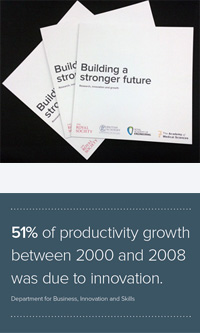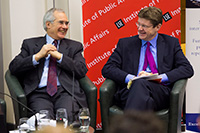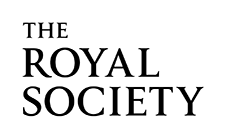|
| Can't view this email? Please click here to view the online version. |
|
 |
|
|
|
|
|
 British Academy urges the next Government to help make the UK the best place to do research and innovation
British Academy urges the next Government to help make the UK the best place to do research and innovation
In partnership with its fellow national academies, the British Academy published a new statement on 10 February called 'Building a Stronger Future'. It sets out what the next Government will need to do to ensure the UK retains a strong research and innovation base, placing them at the heart of plans for long-term economic growth. Academy President Lord Stern joined Professor Dame Ann Dowling (Royal Academy of Engineering), Professor Alex Halliday (Royal Society), Professor Moira Whyte (Academy of Medical Sciences) and Professor Ric Parker (Director of Research and Technology, Rolls Royce) at a well attended press launch at the Science Media Centre.
Speaking at the launch of the statement, Lord Stern said:
'A Government interested in growth, a Government interested in prosperity and health in its broader senses, has to invest more strongly in research, development and innovation, and it has to walk arm in arm with businesses and charities.'
|
|
 |
|
|
|
|
|
|
|
|
British Academy calls for reconsideration of the 'Prevent Duty' guidance
|
|
 The British Academy has called for aspects of government policy to be reconsidered in response to the consultation over the 'Prevent Duty' draft guidance to be issued under the Counter-Terrorism and Security Bill.
The British Academy has called for aspects of government policy to be reconsidered in response to the consultation over the 'Prevent Duty' draft guidance to be issued under the Counter-Terrorism and Security Bill.
The Academy's response states that it is entirely appropriate that the UK Government should seek to do all it reasonably can to prevent people from being drawn into terrorist activity, and fully supports that protective goal.
However, it argues that some of the current recommendations seem potentially counter-productive in relation to higher education – and highlights three main problems it sees with the current recommendations.
|
|
 |
|
|
|
|
|
Minister Greg Clark on why the Humanities and Social Sciences matter
|
|
 'I am defiant in insisting that we should capture in our definition of "science" the humanities and social sciences as well.' Those were the words of Universities and Science Minister Greg Clark MP speaking last week at a joint British Academy/LSE panel discussion. In his work as Minister, he was daily exposed to the interplay of disciplines to tackle issues: for example, alongside medical breakthroughs, an anthropological understanding of local burial practices had helped in the Ebola crisis in West Africa.
'I am defiant in insisting that we should capture in our definition of "science" the humanities and social sciences as well.' Those were the words of Universities and Science Minister Greg Clark MP speaking last week at a joint British Academy/LSE panel discussion. In his work as Minister, he was daily exposed to the interplay of disciplines to tackle issues: for example, alongside medical breakthroughs, an anthropological understanding of local burial practices had helped in the Ebola crisis in West Africa.
Dr Clark added that the Government's recently published Science and Innovation Strategy 'looked to reflect the justified position of confidence that UK science and social science and the humanities enjoy at the moment. By any measure this is an area of strength and national pride, and it is increasingly recognised around the world. ... There is a recognition – across party and across the country – that we have something very substantial and precious in our capability in research, and that we need to add to it over the years ahead.'
The event also featured British Academy President Lord Stern and LSE's Pro-Director of Research, Professor Julia Black. They discussed the true nature of 'prosperity' in today's world, the contribution the humanities and social sciences make to it and the role played by a world-leading centre of research excellence such as LSE.
|
|
 |
|
|
|
|
|
British Academy and Royal Society Presidents call for a fundamental debate over the future of REF
|
|
 The results of the 2014 Research Excellence Framework (REF) for UK universities, announced in December, offered clear evidence of the world class quality of UK academic research, including right across social science and humanities disciplines. Prior to the results being published, and looking ahead to the next REF scheduled for 2020, however, the Presidents of the British Academy and Royal Society, Lord Stern and Sir Paul Nurse, called for a fundamental debate on the future of the REF.
The results of the 2014 Research Excellence Framework (REF) for UK universities, announced in December, offered clear evidence of the world class quality of UK academic research, including right across social science and humanities disciplines. Prior to the results being published, and looking ahead to the next REF scheduled for 2020, however, the Presidents of the British Academy and Royal Society, Lord Stern and Sir Paul Nurse, called for a fundamental debate on the future of the REF.
In a letter to Times Higher Education prior to the release of the 2014 results in December, they stated 'We believe it is time to ask crucial questions about whether we are assessing quality in the most sensible way and whether the burden could be reduced and the value of the process enhanced.' |
|
 |
|
|
|
|
|
Newton international Fellows arrive in the UK
|
|
|
The seventh cohort of British Academy Newton International Fellows arrived in the UK in January to take up their fellowships. 14 early career post-doctoral researchers from a range of different countries will be carrying out two years of humanities or social science research in leading UK universities on topics ranging from reducing the risk of language and literacy disorders in preschoolers from disadvantaged backgrounds, to historical and legal research in relation to international criminal law and the Cold War.
|
|
 |
|
|
|
|
|
Eight British Academy Fellows receive New Year's honours
|
|
|
The British Academy congratulates eight of its Fellows recognised by The Queen in the 2015 New Year's Honours for their outstanding services to Higher Education and Research in the Humanities and Social Sciences. There are knighthoods for Professors Jonathan Bate, Julian Le Grand and Nigel Thrift, and Professor Marina Warner becomes a Dame. CBEs are awarded to Professors Graeme Barker and Heather Joshi, and OBEs to Professors Geoffrey Hosking and Hugh Williamson.
|
|
 |
|
|
|
|
| What is Well-Being and how and why should it influence public policy? |
|
| In January the British Academy launched its third series of British Academy Debates, putting well-being under the spotlight. What should the term 'well-being' encompass, what contributes to it, and why is it important? How should different concepts of well-being affect our understanding of social and economic change? What difference should different concepts of well-being make to the way we approach public policy?
The first two Debates were held in Salford and in Cardiff – the final event takes place in London on 4 March, where speakers will include Lord O'Donnell and David Halpern.
|
|
 |
|
|
| Media Partner: |
|
 |
|
|
|
|
|
|
|
|
 |
|
Tackling the Great Challenges of the 21st Century |
|
| A joint event with: |
 |
|
|
| The Royal Society, 6 – 7.30pm |
|
| Join Sir Paul Nurse and Lord Stern as they discuss the new opportunities – and need – for collaboration between the traditional academic disciplines to respond to the big issues of our time, highlighting why the UK's research base is such an essential national asset.
|
|
 |
|
 |
|
Wealth in the Downturn: Winners and Losers |
|
| 6 – 7.30pm |
|
| Join us for the launch of a new report on the winners and losers of the 2008 recession. A distinguished panel will look at wealth and debt in the period since the recent recession and explore the findings of this report, uncovering who has really won and lost since 2008. The event is a partnership between the Social Market Foundation, Understanding Society's Policy Unit (based at the Institute for Social and Economic Research at the University of Essex) and the British Academy. |
|
 |
|
 |
|
The Skeleton in the Car Park – Richard III and the legacy of his re-discovery |
|
| 6 – 7.30pm |
|
| In September 2012 the excavation of a skeleton from a Leicester city car park ignited worldwide media frenzy. Six months later the team behind the excavation confirmed the identity of the skeleton as King Richard III. Two years on, as his body is reinterred in Leicester Cathedral, what difference has this discovery made? Join us to explore the wide ranging impact of the discovery and its ramifications for disciplines as diverse as archaeology, history, literature and drama.
|
|
 |
|
|
|
|
|
|
When the Party's Over
|
|
|
|
How will the UK fare after a long period of fiscal squeeze? What are the lessons that can be learned from historical periods of spending cuts, or situations internationally? Following a thoroughgoing examination of these issues at a British Academy conference, the proceedings of which were published in When the Party's Over, a policy forum was held with academics and practitioners to discuss the lessons of past episodes of fiscal squeeze. Held on 5 February, the discussions brought academic research to bear on critical decisions to be made by current and future governments, both in the UK and internationally.
|
|
 |
|
|
|
|
|
Dowling Review seeks evidence on academic and research collaborations with industry
|
|
The President of the Royal Academy of Engineering, Dame Ann Dowling, is leading a review examining how Government can support the development of more effective collaborations between businesses and university researchers in the UK. Professor Tim Besley FBA represents the British Academy on her Review Group. The objective is to help researchers to understand better the interests of industry and to facilitate the development of trusting relationships that will deliver broad-based benefits through linking the long-term strategic needs of business with the UK research across the full spectrum of research disciplines and businesses of different sizes, types and sectors. The Review Group has now issued a call for written submissions of evidence from both individual academics and business representatives.
A workshop is also being planned for academics from all disciplines to discuss their own first hand experiences, both positive and negative, of collaborating with industry. It will be held at the Royal Academy of Engineering in Carlton House Terrace on 19 February and more information for those interested in attending can be gained from Dr Helen Ewles at the RAEng.
|
|
 |
|
|
Climate change round table with GO-Science
|
|
|
The Academy hosted a joint round table event with the Government Office for Science in December, looking at evidence and communication relating to climate change. Chaired by Lord Stern, the Academy's President, and co-devised with the Government Chief Scientific Advisor Sir Mark Walport, the discussion focused on how best to communicate facts and frame discussions about climate change with both public and government audiences.
This event forms part of a growing workstream at the Academy on energy and the environment, including a series of British Academy Debates in the autumn, and a new public policy project on energy will also be announced shortly.
|
|
|
|
|
|
Looking at the Future of Ageing
|
|
GO-Science is also exploring the future of Ageing as one of its Foresight projects and is collaborating with a wide range of organisations to map the research being carried out across the UK on a number of dimensions of the issue – from infrastructure changes to finances post-retirement.
The Academy hosted a round table event for organisations active in this area to hear about the wide range of policy and research work being undertaken. It was an opportunity to highlight again the Academy's recent debates on Ageing, and their focus on challenging stereotypes about later life.
|
|
|
|
|
|
Revolution and realities in South Asian higher education
|
|
|
In partnership with the British Council and the SOAS South Asia Institute, the British Academy hosted a high-level policy round table event in January with a focus on the current state of higher education in South Asia. It brought together a select audience of policy makers and higher education experts from Afghanistan, India, Pakistan, Sri Lanka, Iran and the UK to examine the urgent challenges facing higher education in the South Asia region and develop recommendations for change. |
|
 |
|
|
|
|
Volume 2 of the online open-access Journal of the British Academy was brought to completion in December with the posting of five new articles: |
|
|
|
|
|
|
|
|
|
|
|
|
|
|
In December 2014, 20 Biographical Memoirs – extended obituaries – of Fellows of the British Academy were added to the Academy's online open access archive. These include the long-awaited memoir of Anthony Blunt (1907-1973).
http://www.britishacademy.ac.uk/memoirs/13/
10 Academy monographs and volumes of essays have been added to British Academy Scholarship Online. See more here |
|
|
|
|
|
| The latest issue of the British Academy Review is now available. Among articles on a variety of topics is a feature on the film 'The Imitation Game', a contender for Oscars glory later this month, which offers a timely reminder of the role of humanities scholars in the Bletchley Park story. |
|
 |
|
|
|
|
| Click here for more information on all our academic publications |
|
|
|
|
 |
|
Further information on the activities highlighted above, and many others,
can
be found on the British Academy website: www.britishacademy.ac.uk |
|
|
|
| To unsubscribe/subscribe please email newsletter@britac.ac.uk |
|
Copyright © 2015 British Academy,
All rights reserved. |
|
|
|